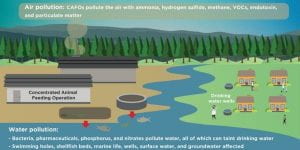Our police system and the industrial agricultural practices we have in the US are unsustainable, both in nature and in practice. They have no place in the just, peaceful world of the future. The roots of the police system make it an inherently violent institution, as it has developed from a slave catcher system. A LONG history of criminalizing Black people, in addition to for-profit prisons in the US, broken windows policing in neighborhoods, and over militarized police have culminated in a disturbingly unjust “justice” system. As it currently functions, our justice system results in violence being disproportionately perpetuated against Black, Indigenous, and People of Color.
Currently, I have sensed a lot of apprehension around the idea of defunding the police, a popular demand within the Black Lives Movement. Common reactions I’ve heard include the fear of anarchy and chaos, crime running rampant, and concern regarding the livelihoods of those who are currently working within the police system. I feel that these concerns mirror the concern that replacing industrial agriculture with local, organic, food-sovereignty centered agriculture would not be sufficient to feed a growing population.
Based on what we learned in class, I would argue that yes, an immediate, complete overhaul of the industrial agricultural system we have now would not only be unsustainable, but would have some very negative repercussions for the most vulnerable populations. Lower income communities of color and Black communities currently depend on cheap, processed food that is made possible by industrial agriculture. In order to avoid disastrous consequences that a complete overhaul would pose for these communities, industrial agriculture must be dismantled while simultaneously investing into organic practices. For example, instead of having 80% of the Farm Bill go towards food stamps, what if 80% of the Farm Bill went towards conservation efforts and investing into regenerative development projects, like the Sweet Water Foundation?
The Perry Avenue Community Farm in Englewood, Chicago. This farm is overseen by Emmanuel Pratt, the executive director and cofounder of the Sweet Water Foundation. Read more here. Sweet Water Foundation
The dismantling of the industrial agriculture system will not be sufficient without investment into critical resources. This same argument can be made for defunding, and eventually abolishing, the police. It is important for people to understand that the call to defund the police is also a demand to invest in critical community resources, like social workers, mental health resources, rehabilitation centers, housing for homelessness, and education just to name a few. The investment in these resources will lead to a decrease in violence and crime, working simultaneously to decrease the significance of a police force.
This image shows some of the thoughts behind the Defund the Police/ Abolish the Police Movements. The demands have a heavy focus on community investment. 8toabolition.com
With both of these examples it is important to understand that systemic change is a long-term goal that involves investing in the people and practices we intend to see in the future. It cannot be done overnight, but that should not stop it from being done at all. Here is to a just, sustainable, and peaceful future for all!

















